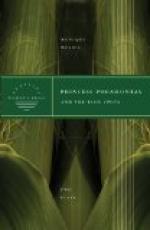When they reached the outskirts of London the crowds increased so that Pocahontas turned to Rolfe and asked:
“Why do all the folk run hither and thither? Is there news of the return of a war party or will they celebrate some great festival?” And she could hardly believe that it was only a gathering such as was to be seen every day. However, as soon as those in the crowd caught sight of her they began to press more closely to gaze at her and at Uttamatomakkin, who looked down at them as unconcernedly as if he had been accustomed to such a sight all his life. Officers of the Virginia Company appeared just then with a coach, into which they conducted Pocahontas, Rolfe and little Thomas, so that they escaped from the curiosity of the crowd.
The days that followed were filled with strange and new enjoyments. Mantuamakers and milliners brought their wares, and Lady Rebecca soon began to distinguish what was best in what they had to offer. She drove in the parks, was rowed down the river in gorgeous barges, had her portrait painted in a gold-trimmed red robe with white collar and cuffs and a hat with a gold band upon it, received the great ladies who came out of curiosity to see for themselves what an Indian princess might be like. All of them had only kind things to say about “the gentle Lady Rebecca.”
The Bishop of London was in especial interested in this heathen noblewoman who had become a Christian. He was her escort on many occasions and decided to give a great ball in her honour.
“What will they do, Master Bishop?” she asked of the dignitary who had grown as fond of this new lamb in his flock as if she were his own daughter. “What will all the ladies do at a ball?”
“They will dance.”
“Dance!” exclaimed Pocahontas in amazement, who had never seen any other kind of dancing than that which she herself, clad in scant garments, had been wont to practice before she became the wife of an Englishman. This, she now knew, was not of a character suited for English ladies. So, some days later, watching the stately measures and the low reverences of ladies and their cavaliers, Pocahontas wondered what pleasure they could find in such an amusement.
“Perchance, though,” she suggested to the good Bishop, “it is some religious ceremony which I know not.”
The Bishop laughed so at this idea that Pocahontas could not help laughing, too, though she did not understand what was funny in her speech.
After the dance was over the ladies came to be presented to Lady Rebecca. They did not know what they ought to talk to the stranger about; but one of them in a dull mouse-colored tabby, with sad-colored ribbons, remarked languidly:
“What a fine day we are having.”
“Fine!” exclaimed Pocahontas, looking up at the grey sky through the window, which to be sure had not dropped any rain for twenty-four hours, “but the sun is not shining. I should think here in England ye would wear your gayest garments to brighten up the landscape.”




